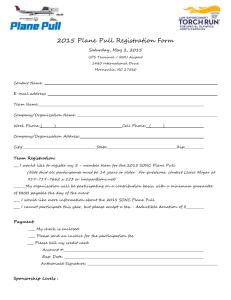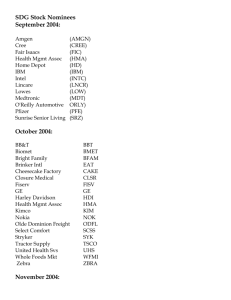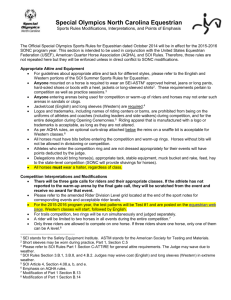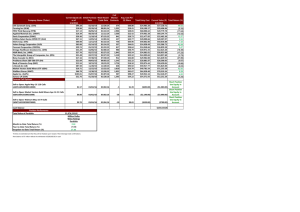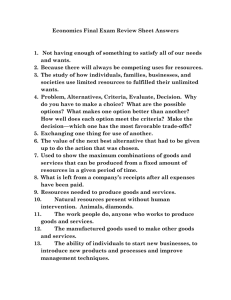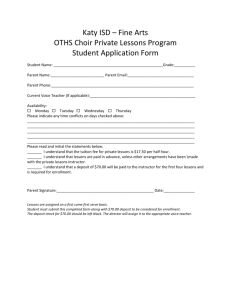Finance Summary - Special Olympics North Carolina
advertisement
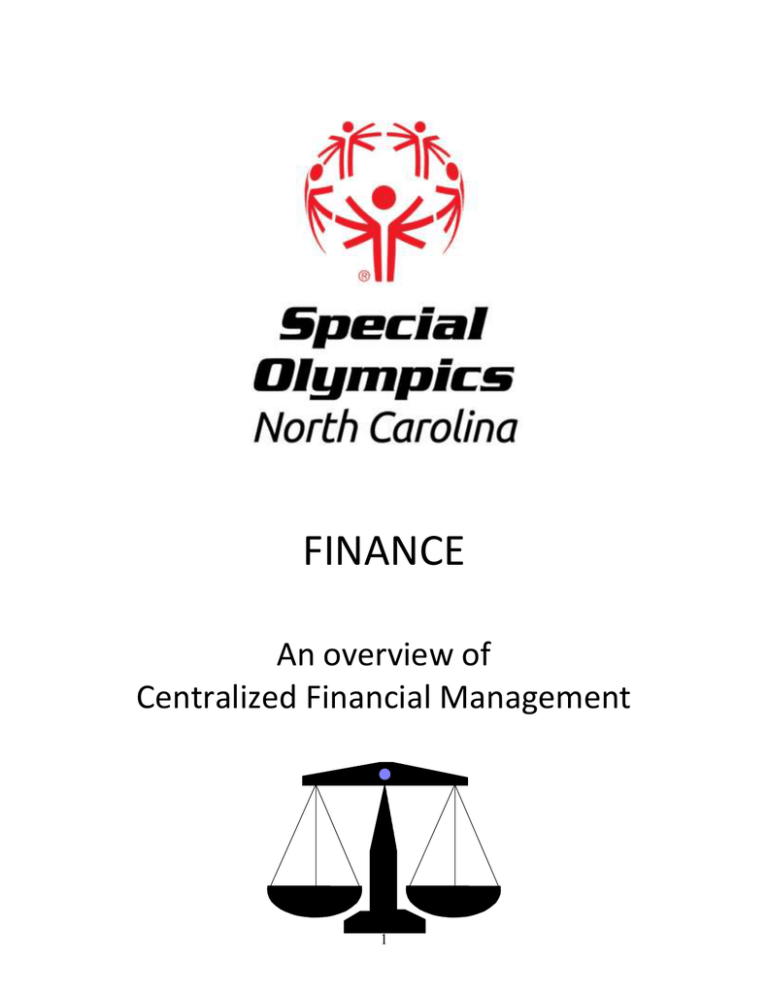
FINANCE An overview of Centralized Financial Management 1 Pooled Banking System Structure Special Olympics North Carolina, Inc. (SONC) is the only legal entity authorized by Special Olympics, Inc. (SOI) and recognized by the State of North Carolina to administer the Special Olympics Program throughout North Carolina. SONC is a private non-profit corporation and has a 501(c)(3) status as determined by the Internal Revenue Service (IRS). A Board of Directors that is responsible for all fiduciary responsibilities, including fundraising and financial management, governs the organization. The Board also has the responsibility of employing the President of the organization, who is held responsible for managing the organization. Included among the numerous topics of organizational management is the financial management of the organization. This single function is very important because SONC annually raises and spends several millions of dollars to carry out the Special Olympics mission. These funds must be accounted for in a prudent and professional manner to assure the donors that have contributed to the organization that all funds are being used correctly. For the benefit of the grassroots level of the organization, a centralized financial management system exists called the SONC Pooled Banking System. Quite simply, the Pooled Banking System manages all the funds raised and spent at the grassroots level by its accredited subprogram in the name of Special Olympics. As a condition to maintaining accreditation with SOI, SONC must ensure that its Sub-Programs (local programs) conduct their affairs in accordance with the financial management and reporting standards that are acceptable to SOI. Based on the SOI General Rules, SONC requires in the SONC Operating Policies that all funds raised in the name of Special Olympics in North Carolina be deposited in a bank account opened and maintained solely in the name of Special Olympics North Carolina, Inc. SONC disburses these funds through designated individuals and/or employees who are authorized by the SONC Board and President for payment of appropriate and approved Special Olympics expenses. This policy also allows SONC to meet the SOI requirement of providing Sub-Program combined results, reflected as a single reporting entity. SONC is required on an annual basis to have an independent audit so that each year’s financial management process is reviewed for accuracy, dependability and accountability. Since all funds raised in the name of Special Olympics, from the grassroots level to the state level, are maintained by SONC, the audit is conducted more efficiently. 2 Pooled Banking System Purpose While SONC has lessened the risk of financial improprieties through the use of a centralized banking system, there are several other practical reasons that Pooled Banking is beneficial. Accredited local programs are able to use operational funds through the Pooled Banking System in order to offer training and competition to athletes in their program. When a local program uses all of its financial resources, it can continue to operate due to the pooled banking system. In a situation without Pooled Banking, a local program would not have the ability to offer competition once its financial resources were exhausted. Note that local programs have to seek prior approval from the SONC President and show a plan to repay its deficit prior to spending more than its balance. A centralized financial management system in one bank account allows for lower costs of banking as well as more attractive interest rates. Through the Pooled Bank account, monthly bank fees are shared among the more than 100 local programs with account balances, rather than each local program paying to maintain a separate account. Additionally, the large amount of aggregate funds that are in the Pooled Banking account can generate an interest credit that offsets the costs of bank fees. The SONC finance staff handles the task of reconciling the Pooled Banking account statement. This releases the local programs from going through this process. Additionally, the local program is not required to prepare financial statements from their transactions. The only requirement is that copies of supporting documentation be maintained and accompany all check authorization and deposits submitted to SONC. These records can be used to verify the Pooled Banking statements issued by the SONC finance staff. The records generated by the Pooled banking System allow the SONC Board and staff to track fundraising and expense trends at the grass roots level. This tracking is important in the development of future budgets and monitoring historical financial information. 3 Internal Revenue Service Department of the Treasury P. O. Box 2508 Cincinnati, OH 45201 Date: May 5, 2005 Person to Contact: Ms. Jackson 31-07417 Customer Service Representative Toll Free Telephone Number: 8:00 a.m. to 5:30 p.m. EST 877-829-5500 Fax Number: 513-263-3756 Identification Number: 56-1149607 Special Olympics North Carolina Inc. 2200 Gateway Centre Blvd, Suite 201 Morrisville, NC 27560 Dear Sir or Madam: This letter is in response to receiving your request to change the address of your organization to what is reflected in the heading above and on our records. In November 1972 we issued a determination letter that recognized your organization as exempt from federal income tax. Our records indicate that your organization is currently exempt under section 501(c)(3) of the Internal Revenue Code. Our records indicate that your organization is also classified as a public charity under sections 509(a)(1) and 170(b)(1)(A)(vi) of the Internal Revenue Code. Our records indicate that contributions to your organization are deductible under section 170 of the Code, and that you are qualified to receive tax deductible bequests, devises, transfers or gifts under section 2055, 2106 or 2522 of the Internal Revenue Code. If you have any questions, please call us at the telephone number shown in the heading of this letter. Sincerely, Janna K. Skufca Janna K. Skufca, Director, TE/GE Customer Account Services 4 Check Authorizations A SONC Check Authorization form is used to request payment for expenses from a Pooled banking account by the accredited local program coordinator. These authorizations, along with supporting invoices or receipts, must be submitted in a timely fashion to ensure that bills are paid on time. SONC cannot pay expenses from account statements or packing slips issued by vendors because statements usually lack the detail required for proper review. Check authorizations should be forwarded directly to the appropriate SONC field services director, who then will forward to the SONC Finance Department. Proper supporting documentation must accompany ALL check authorization forms with the exception of cash advance requests. Any check authorization without supporting documentation, or one that is not filled out completely will be returned to the Local Coordinator for correction. Checks are issued once a week, usually on Tuesdays. Authorizations for payment of invoices should be submitted to your area director well in advance and completed properly in order to ensure timely processing payments. Request for payments turned in to the SONC Finance Department by Monday at 5:00 p.m. will most likely be issued in the following Tuesday’s check processing. However, in the event a question arises concerning an invoice, the authorization will not be processed until research is completed. The SONC president ultimately has the authority to approve all authorizations. Only accredited active local programs are able to disburse funds from a Pooled Banking account. Due to the fact that all checks are issued weekly, we believe that this leaves adequate time for local programs to turn in their check authorizations. To further ensure vendors receive payments in a timely fashion, we request that any arrangements made with vendors include net 30 days payment terms. 5 Instructions Payee: Name of vendor to receive payment. Address: This is the complete address where check is to be mailed. Payments are sometimes mailed to an address other than their physical address. It can be noted as the “Remit To” address. Invoice#: We can and do track payments to vendors by their invoice number. It is important that you list the invoice number on the check authorization. If no invoice number is available, use the date of the request as your invoice number. Ex: Request Date is June 25, 2005, your invoice number would then be 062505. Invoice Date: This is the date the vendor issued the invoice or the date of your request. Brief Description of Purchase: This provides the basic information for the purchase, for example: “T-shirts Spring Games” or “Port-A-Jons Fiesta Biathlon”. Account Number: This is the SONC assigned account number. It indicates the type of purchase it was, such as 8133 - uniforms, 7121 – officials, etc. Please refer to “Chart of Accounts” for the correct codes Account Description: This is the description for the account code used, example: uniforms, photography, or officials. Purchase Amount: This amount is the total purchase price of the individual items and it does not include sales tax. Sales Tax: This amount should equal the amount of state and local taxes for the total items purchased. SONC files a refund with the state and applicable local municipalities every six months in order to get this money back for the local programs. Total Purchase Amount: Total amount of invoice including sales tax. This amount must equal the total amount of invoice or total of all receipts. Local Program: This is the name and number of your local program. Ex: Iredell, #78 Local Program Coordinator: Only the Local Program Coordinator is authorized to approve purchases made on behalf of the local program. Date: Date submitted by Local Coordinator. Field Services Director: This is where your SONC field services director verifies that they have reviewed the check authorization before sending it to the SONC Finance office. Date: Date approved and submitted by field services director. 6 Sales Tax: SONC applies for a tax refund annually and local programs get their tax reimbursement amount credited to their account, so it is important to document all sales taxes that are paid. The amount of the local program tax reimbursement is based on what is documented and submitted. Document all sales tax with the exceptions noted below. This includes tax paid on meals, uniforms, sports equipment, etc. The tax must be shown on the receipt. DO NOT break out tax paid on any of the following: Electricity, piped natural gas, telephone services The purchase, lease or rental of motor vehicles Local occupancy or local prepared food and beverage taxes Scrap tire disposal or white goods disposal taxes Reimbursements for out of pocket/volunteer reimbursements. This does not affect cash advance returns. 7 Cash Advance and Cash Advance Return Cash advances for the sole use of SONC expenses up to $2,500 are allowable at any time to SONC staff and volunteers in good standing, subject to approval of the president or his designated representative. Cash advances are a way to reduce the amount of out-of-pocket expenses for volunteers. Issuing cash advances will prevent volunteers from being burdened with outflows of personal cash during events. Amounts above $2,501 can be issued if approved by the president. The SONC Finance Dept. is responsible for informing the area director of any cash advances that remain outstanding for 60 days. If at any time, cash advances remain outstanding for 60 days and exceed $500, that sub-program/person will not be given another advance until the entire balance exceeding 60 days is resolved. Limitations will be placed on cash advances in violation of the above limits even if the offender is not informed of his/her delinquency in a timely manner. Note that a sub-program/person will continue to be reimbursed for expenses regardless of their cash advance status. This procedure is not meant to penalize athletes, but to mitigate the risk of improprieties of Special Olympics funds. Cash advances will be processed after receiving an approved check authorization form from the requesting party. The request will be reviewed by the SONC Finance Dept. for other advances that have become delinquent in accordance with this policy. The cash advance request will be issued in the form of a check to the party if s/he is in good standing. On a regular basis, SONC will review the listing of outstanding cash advances for delinquency. Upon discovery of delinquent cash advances, SONC will inform the area director of their status. If a party is found to be in violation of the delinquency policy and that delinquent amount exceeds the threshold, no additional cash advances will be granted until the entire amount exceeding 60 days is resolved. Prior to an event that requires a volunteer to have cash, the local coordinator should complete a check authorization requesting a cash advance for that event. It is recommended that the local coordinator allow at least four weeks for SONC to receive process and return a check to the volunteer. This is important, as without enough notice prior to the event, SONC cannot guarantee that the volunteer will receive the cash advance check in a timely manner. After using the cash from an advance, the volunteer needs to complete the cash advance report form that was mailed to them with the advance check. This form is used to detail the expenses paid for with the advance. All expenses should be supported with receipts. Hand written receipts, unless containing the stamp of the business or on business letterhead, are not acceptable. Please attach all receipts to the receipt form. It is extremely important that these receipts are provided due to the fact that SONC is audited annually. The SONC Finance Department and auditors review cash advances receipts to ensure that all purchases are in the best interest of SONC. 8 If the volunteer does not spend the entire cash advance, this money should be deposited into the local program pooled account (coded to the cash advance return account number with the name of the individual who received the advanced listed as well). Please make sure to label these deposits clearly for proper credit by the SONC Finance Dept. If the volunteer spends more than the cash advance, that volunteer can indicate that they would like to be reimbursed for the amount spent over the advance. SONC will review these forms and reimburse any volunteer who indicates they would like to be reimbursed. Instructions for cash advance returns: Complete the top portion of the form including your program name, pooled account number, and the name of the person who received the cash advance. In the description section, total up your receipts by account codes, not by vendors. Example: o Uniforms for local competition would be account code 8133 o Meals during state games travel would be account code 8163 Make sure to separate out the tax on your receipts and put the total amount of tax paid on the last line as indicated. Take all your receipts and tape or staple them to a plain sheet of 8½ x 11 paper so that you can see each receipt. You can have several receipts on one page and can use as many sheets as necessary to hold all of your receipts. Attach the receipt pages to the back of your cash advance return form. If you have not spent the entire amount of the cash advance, complete a deposit slip and take it to the bank. Attach the imprinted copy of the deposit slip to the cash advance return form. If you have spent more than the cash advance amount, indicate if you want to be reimbursed or want that to be considered a donation to your local program. Make photocopies of all of the pages of the cash advance return sheets and mail the original to your area director. Cash advance return forms that are not completed correctly can delay any reimbursement. If you have questions or need clarification on these instructions, please contact your area director. 9 Volunteer Expense Reimbursement A volunteer expense reimbursement form is provided on the next page. Please use this form to receive reimbursement for expenses that you or your volunteers have paid on behalf of Special Olympics. This form should be forwarded to the appropriate SONC area director, after being signed by the local coordinator, for processing. The check will be paid to the name on the top of the form and mailed to the address on the top of the form. It is also important to list the local program name and number to ensure proper processing. Instructions for Volunteer Expense Reimbursement Fill in the local program name and coordinator’s name Fill in the name of the volunteer who will be reimbursed and include their full mailing address For travel on behalf of SONC, fill in the top grid with: o The date o Beginning, ending and total mileage o The purpose for the travel. o Your local coordinator can complete the account codes section. o Please note that the IRS sets the mileage reimbursement rate for volunteers. The current rate for 2007 is 14 cents per mile. For purchases made on behalf of SONC, fill in the bottom grid with: o The date o Description of the purchase, ex. office supplies, refreshments, etc o Enter the full amount of the purchase including taxes paid o An explanation for the purchase, ex. Spring Games, committee meeting, etc. o Your local coordinator can complete the account codes section Add up the total expenses from the top grid and the bottom grid for the grand total Check the box to be reimbursed – OR – check the box to consider this a donation to the local program. Sign and date the form Send it to the area director to be processed Please note: Because SONC cannot file for a refund of sales tax with a volunteer expense form, sale tax is not listed separately on reimbursements. 10 Deposits Any money donated to your local program should be deposited immediately upon its receipt. Donations not deposited in a timely manner could be misplaced. Consistent with the process for check authorizations, deposit slips should be sent to your area director as soon as the actual deposit is made. Deposit slips must be validated by the bank (dated receipt) before the local program will receive credit of the funds. Failure to turn these in can result in deposits not being properly credited to an appropriate pooled account. If possible, please attach copies of the check donations with the appropriate deposit slip before submitting to the field services director. SONC will use these copies for donor source tracking, reconciliation and the annual audit. The proper way to complete the Deposit slip is as follows: Use the correct deposit slip. Use the SONC deposit slips with the account number 20 – 6263 – 0862007. You can get these deposit slips from your field services director. Do not use the blank deposit slips provided at the bank. On the top of the slip are two lines that reference your program and unit code. Be sure to neatly complete these two lines with your program name (program line) and number (unit code). Currency/Checks: These two items should be filled in accordingly listing a grand total at the bottom. If you need more than one deposit slip or deposit form, list the total of the entire deposit only once on each form. If you do not have a Wells Fargo Bank in your county, please send the completed bank deposit slip, the “Local Program Deposit Form”, and the checks for the deposit to your field services director. If the deposit slips do not have a third copy for your records, keep the receipt given to you by the bank or make a copy to send to the field services director. If you deposit money into the pooled account but do not send in your paperwork, those funds will be listed on the “Unidentified Deposits” list. To claim the funds for your local program, simply submit the deposit paperwork to your field services director. 11 Local Program Deposit Form After you have completed the bank deposit slip and taken it to your local Wachovia Bank, take one of the copies returned to you and tape or staple it to the Local Program/Agency Deposit Form. See attached sample. Program Name: List the name of your program here. Number: This is your local program number (also referred to as unit code on the deposit slip). Region This is your SONC region (East or West) Date of Deposit: the deposit slip. This is the date the deposit is posted by the bank. It is imprinted on Account No.: This is the revenue account number. Please refer to the bottom of the form for numbers. Received From: This is the donor source. Example: Walmart, various donors, etc. Description / Purpose: This is description for the deposit. Please be specific so that funds raised will be properly and consistently tracked. Example: Candy Sale, Golf Tournament, Letter Campaign. Amount: List total amount of each line item by account number. Local Coordinator and Field Services Director Line: Appropriate signature required. Please Note: If you have more than one check and all are the same type of donation, total all and list only once on the deposit form. The only exception would be a large donation that you want to track separately. EX: J. Smith A. Brady L. West $ 50 List As Follows: 01-3110-998 Various Donors $150 $100 01-3110-998 L. West $800 12 $800 13 NSF (Insufficient Funds) Notices When a local program deposits a check that gets returned for insufficient funds (NSF) or bounces, Wells Fargo will send a notice to the SONC finance office. The returned checks may be sent to Checkcare Systems Inc, a check verification service company that SONC has contracted to pursue any bad checks deposited into the organization’s account. Local programs will be notified of returned checks included in their respective deposits with the memo on the bottom of this page. Money recovered by Checkcare on checks deposited into a local program’s account will be returned to that local program. MEMORANDUM Date: To: From: Cara Hudson, Finance cc: Re: Non Sufficient Funds (NSF) Deposit Enclosed please find a copy of a returned check that was recorded as a deposit for your local program. According to our records, this check was originally deposited in _________________________County, on _________________________, and has been returned for the following reason: _____________________________. We have removed the amount represented in this check from your local program’s pooled account since the funds are not available for Special Olympics use. We have forwarded the bad check to Checkcare Systems Inc, who will pursue the funds from the check writer. Any money collected on the bad check will be returned to your local program’s account. If you have any questions, please feel free to contact me at 800-843-6276, ext. 107, or your field services director. 14 Value In-Kind Donations Every local program gets support in some form from their community. This support might be services, reduced costs for items, or budget assistance. Any donation of services, goods or funds that is budget relieving, i.e., the local program would usually incur a cost for, is considered Value In Kind (VIK). The main types of VIK are non-cash donation of goods, professional services, appropriation of funds. Non-cash donations of goods: Non-cash donations of goods are donations of items other than cash that are tangible. A donation of sports equipment is a perfect example. Any donation of goods is an in-kind regardless of its value to the public or the Organization. While these things have a value, it is sometimes difficult to quantify how much they are worth. The best way to calculate their worth is to either ask the donor or find out how much it would cost to buy the item from a store. Finding out this information is important for the donor, as well as the SONC office. The donor needs this information in order to receive a tax deduction for his/her gift. The value of the item(s) should match the amount listed on any thank you note that is returned to the donor. It is important for the SONC office to properly account for this gift. Donation of time by specialists Accounting procedures dictate that only a donation of time from a specialist counts as an inkind donation of time. A good example is a doctor that donates his time for physicals or the PE instructor that serves as the Games Director for your local competition. The value of this gift is the hourly rate that this person would normally be paid for their service multiplied by the number of hours they volunteer. The easiest way to find out the hourly rate for this person is by asking them. Volunteers that serve in roles that are not related to their profession, such as a secretary volunteering as a timer for the local games, can not be included. Appropriation of funds from government, schools, etc. Frequently local governments and school systems will allocate funds to support the local program. All expenses that are paid by these entities supplement the operation of the local program and are considered VIK. VIK contributions should be documented either per donation or on a VIK log. These documents will assist you with tracking your donors and supply information for future fundraising campaigns and volunteers. The VIK forms can be turned in periodically or at the conclusion of the season/year. Submitting VIK documentation is a required part of the local program accreditation. 15 Budget Process: The process of establishing a budget is very important for the financial success of each local program. It is important to plan your expenses for the upcoming year in order to understand the amount of fund raising that needs to be performed in order to do all the activities that you have planned. As a general rule, the total amount of your expenses should not exceed the amount of revenue that you can generate. During the year, it is important to compare your budget to the actual expenses and revenue in order to make sure that your local program will be able to meet its budget. If the local program is over budget, this is the time to either plan for more fundraising efforts or cut back on expenses in order to make budget. Field services directors are available if you need assistance with this process. Financial Reporting: The local program coordinator will receive a packet of financial information pertaining to the local program. This packet should be used to check all transactions to ensure that they have been properly recorded. Any discrepancies between your records and the pooled banking records can be resolved, if brought to the attention of your field services director, in a timely manner. SONC recommends that all local coordinators review these reports as they are received. Checks disbursed, deposits made and any other transactions involving local program funds will be listed in the month in which they occurred. Keep in mind that cash disbursements will appear on this listing on the date in which they were issued by SONC and not when they left the local program office. Also note that the checks deposited at the end of the month will not always appear in that month due to the timing in which they clear the bank. 16 While it is strongly encouraged that this statement be reviewed monthly, local programs will only be asked to confirm agreement of their balance at the end of each calendar year. This confirmation process is performed to give local programs one last chance to find any errors prior to the auditors’ review and the closing of the books. After the auditor’s review, local programs no longer have the ability to correct errors found in the prior year – so please review your statements carefully. Investment Policy Special Olympics North Carolina, Inc. Investment (savings) Program The Board of Directors for Special Olympics North Carolina, Inc. (SONC) is responsible for the governance and fiduciary oversight of the Special Olympics movement as determined by Special Olympics, Inc. (SOI), the State of North Carolina and the Internal Revenue Service (IRS). SOI sets forth policies and procedures for accreditation as a United States Program. The State of North Carolina and the IRS determine laws and regulations which non-profit organizations must follow to maintain 501 c 3 and incorporation status. In its role to oversee the financial management aspect of the organization, the Board has given the President of SONC the authority to establish financial management procedures. These procedures ensure that all funds raised in the name of Special Olympics are spent in an appropriate manner as established by expectations of the Board, SONC’s financial auditor, the SONC staff and SOI. All accredited Local Programs are required to use the Pooled Banking System as established by the SONC Operating Policies set forth by the Board of Directors. Local Programs that lose their accreditation also lose the right to use the name Special Olympics, and therefore all funds are frozen by SONC until such time that an accredited local program is reestablished to carry out the mission of Special Olympics on behalf of SONC in that jurisdiction. In some cases, Local Programs raise more funds than are needed for expenses in a given year. In this case, the Board of Directors have an investment policy for managing funds that they deem appropriate to put in an investment account that is managed by a professional investor with oversight by the SONC President and the Board of Directors. The investment policy was revised in 2000 by the Board’s Finance Committee with input from members of the committee, the SONC Board, Wachovia Securities (formerly First Union Securities), Smith Barney and 17 SONC’s law firm at the time (Smith Helms Mulliss & Moore). The SONC investment policy is included in the SONC Operating Policies, which is available on the SONC website. During the course of the year, Local Program coordinators may deposit funds in the investment account by submitting a check authorization request form to the SONC Finance Director. However, before deposits are made it is important to determine that the funds will not be needed for upcoming operational expenses. The Raleigh office of Wells Fargo Advisors (formerly Wachovia Securities) manages the investments. Withdrawal of funds from the investment program can be requested by contacting the SONC President.. The investment account activity is reflected on the pooled banking statements with interest, and gains/losses posted quarterly. Electronic monitoring of the account by Local Program Coordinators is not possible. 18
